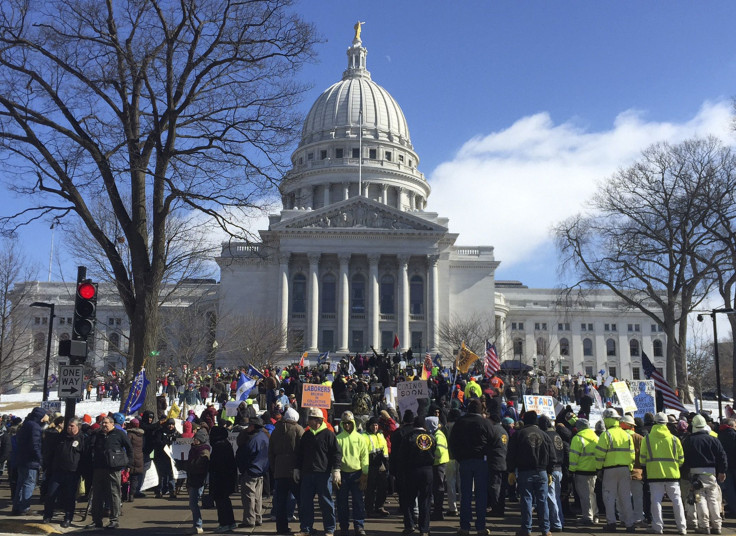Wisconsin Right-To-Work: State Assembly Debate Opens Monday, Protests Do Little To Stop Momentum

Nearly 3,000 people rallied outside Wisconsin's Capitol in Madison on Saturday against proposed right-to-work legislation backed by Republican Gov. Scott Walker. But that's doing little to stop the bill's momentum. On Monday, the State Assembly Labor Committee opens debate on the proposal, which is expected to pass later this week. The Senate passed its version of the bill last week.
Right-to-work laws prevent contracts between employers and unions that authorize the latter to impose fees on workers who choose not to join the union. Under U.S. labor law, unions are required to represent all employees who are members of the bargaining unit. The fees are aimed at preventing "free riders," i.e., workers who benefit from union representation without paying for it. Unions oppose right-to-work measures because they reduce the strength of labor; business groups say the laws help create jobs.
"Right-to-work makes Wisconsin competitive with our neighbors," said Sen. Alberta Darling, one of 17 Republicans who voted to pass the bill last week. Only one of his colleagues broke ranks and joined 14 Democrats in opposition. If the GOP-majority Assembly follows the Senate, the Badger State would join Indiana and Michigan, which both passed right-to-work in 2012. Walker has already said he'll sign the bill.
The Wisconsin AFL-CIO organized Saturday's demonstration at the Capitol. But even the protesters seem resigned to the bill's fate.
"We feel defeated," a nurse there told the Associated Press. "We know this is going to pass."
The number of demonstrators paled in comparison to the crowd of roughly 100,000 that turned up four years ago to oppose an ultimately successful proposal to repeal collective bargaining rights for most state workers.
Some labor advocates, such as Paul Secunda at Marquette University Law School in Milwaukee, have called for more radical actions, such as a mass walkout, to defeat right-to-work. As of Monday, there were no signs that unions planned to heed that call. The U.S. hasn't seen a general strike since 1946, in Oakland, California.
Walker, a front-runner for the GOP presidential nomination in 2016, sees his willingness to confront organized labor as an asset to a potential White House bid. On Thursday, when asked how he'd handle the threat of ISIS, Walker referenced his success in taking on "a hundred thousand protesters." Then, on Saturday, he said President Ronald Reagan's move to bust a 1981 strike by air traffic controllers was "the most significant foreign policy decision" of his lifetime.
© Copyright IBTimes 2024. All rights reserved.






















